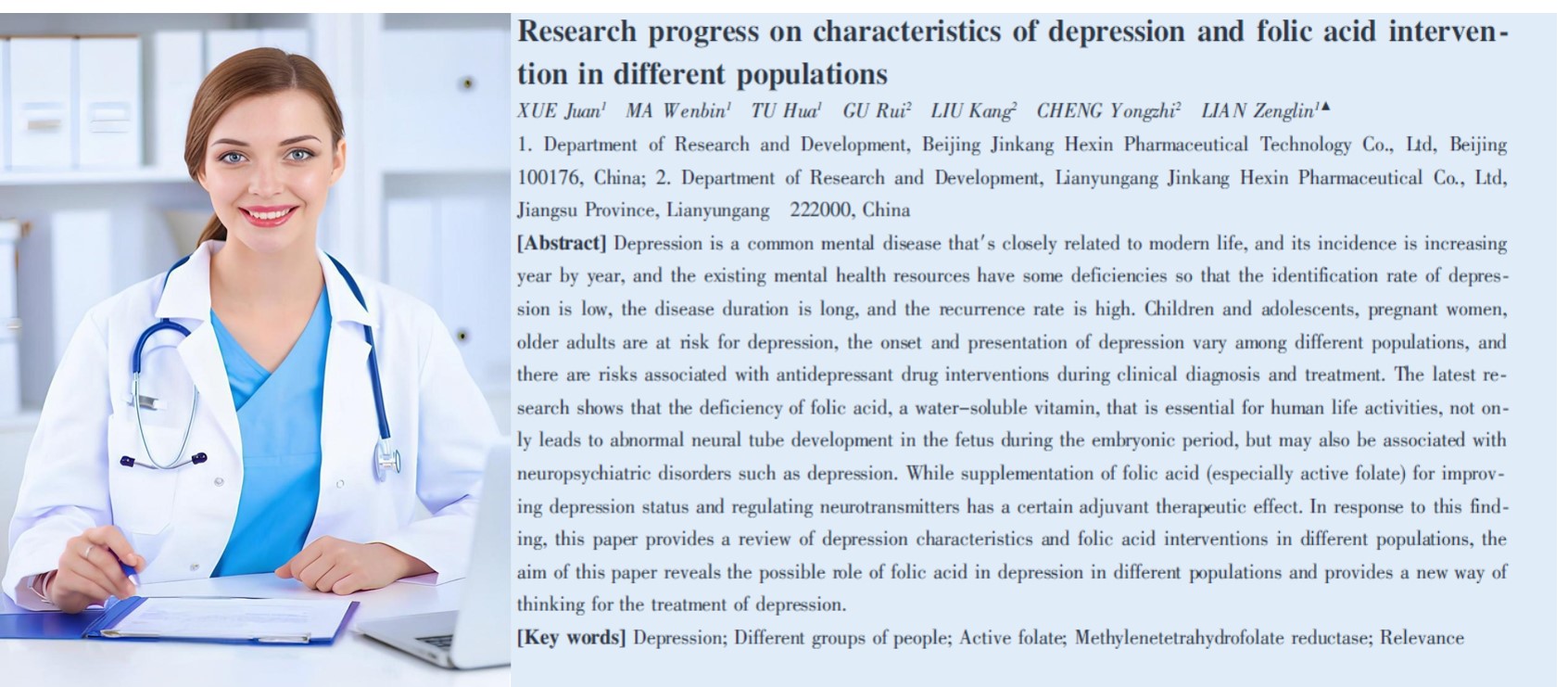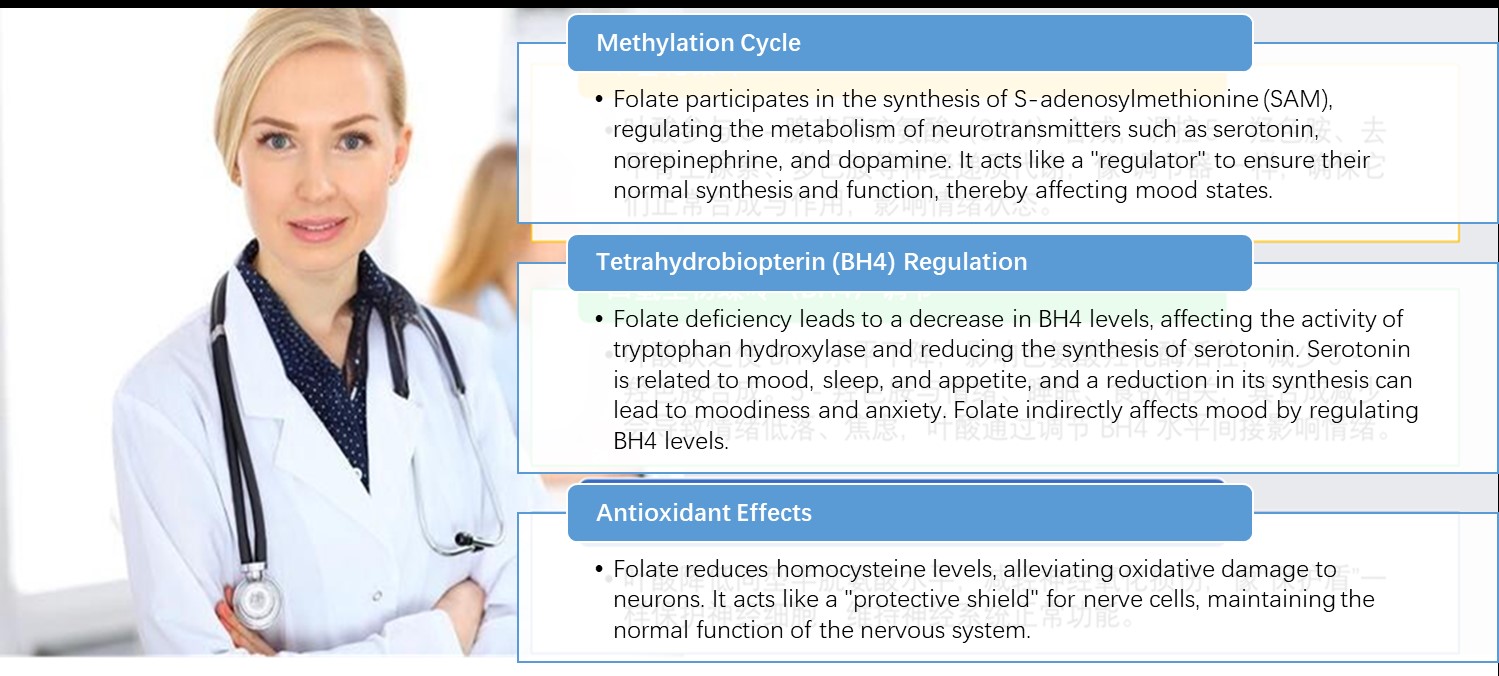In the fast-paced modern life, depression has quietly become a significant challenge affecting people's lives. It looms like a dark cloud over people's hearts, causing them to lose their passion and hope for life. Traditional treatments are essential, but in recent years, a form of active folate known as 6S-5-Methyltetrahydrofolate Calcium (5-MTHF) has gradually come into the spotlight for its unique potential in treating depression. This is especially true for vulnerable populations such as children and adolescents, pregnant and postpartum women, and the elderly.

I. Depression: The Hidden Pain in Different Populations
1. Children and Adolescents: The Overlooked "Little Blues"
Childhood and adolescence are supposed to be vibrant and hopeful periods. However, they can also be a latent period for early-onset depression. Research indicates that about half of all depression cases first occur during adolescence. Among 15- to 18-year-olds, the lifetime prevalence of depression is 11% to 14%, with girls having approximately twice the incidence rate of boys. These young people may experience symptoms such as disinterest in school, loss of interest in activities, insomnia, and withdrawal from social interactions, severely impacting their daily lives and academic performance. Unfortunately, because they are in a stage of constant physical and psychological development, parents and teachers may mistakenly attribute these symptoms to typical growing pains, overlooking the possibility of depression.

2. Pregnancy and Postpartum Period: The "Emotional Storm" for Mothers
During pregnancy and after childbirth, women undergo significant physical and emotional changes, making them vulnerable to depressive symptoms. If left untreated, perinatal depression can have adverse effects on the mother, baby, and family. The arrival of a new life should be a joyful occasion, but many expectant and new mothers find themselves in a state of emotional despair. They may feel anxious and helpless, and in some cases, lose interest in their baby. This not only affects their own well-being but can also negatively impact the baby's growth and development.

3. Old Age: The "Psychological Shadow" of Aging
With advancing age, the physical and psychological functions of the elderly gradually decline, and the degeneration of sensory organs and the nervous system can predispose them to late-life depression. Studies have found that low folate levels, low vitamin B12 levels, and high homocysteine levels may be risk factors for late-life depression. Having experienced the passage of time and the decline in physical abilities, the elderly are more susceptible to psychological issues. They may feel lonely, helpless, and lose confidence in life.

II. The Relationship Between Folate Metabolism and Depression
As early as the 1960s, scientists discovered that low serum or red blood cell folate levels and high homocysteine levels may increase the risk of depression. Patients with folate deficiency who have depression tend to respond poorly to antidepressant medications and have a higher likelihood of relapse during treatment. Folate is involved in important metabolic processes in the human body, such as methylation reactions and the synthesis of neurotransmitters. A deficiency can lead to elevated homocysteine levels, which in turn can affect the synthesis and function of neurotransmitters. This is a key reason for the association between folate and depression.
Folate may influence the pathophysiology of depression through the following pathways:

6S-5-Methyltetrahydrofolate Calcium (5-MTHF) is the active form of folate. Compared to ordinary folate, it has unique advantages: it can be directly absorbed by the human body, rapidly increasing serum and red blood cell folate activity levels. It is not limited by the daily 200-microgram restriction of folate-metabolizing enzymes, breaking through the dosage limitations of synthetic folic acid, and better exerting therapeutic effects.
III. 5-Methyltetrahydrofolate: A New Hope for Different Populations
1. Children and Adolescents: An Antidepressant "Helper"
In the treatment of depression in children and adolescents, many antidepressants are ineffective for severe cases. However, studies have found that 6S-5-Methyltetrahydrofolate can act as a "good assistant" to antidepressants, helping to improve symptoms of depression, anxiety, and irritability in teenagers. It is a safe intervention measure. For example, Dartois et al. (2019) reported in a case series study that 6S-5-Methyltetrahydrofolate adjunctive therapy improved depressive and anxiety symptoms in 80% of patients with treatment-resistant adolescent depression.

2. Pregnant and Postpartum Women: Guardians of Maternal and Infant Health
Research indicates that taking 6S-5-Methyltetrahydrofolate during pregnancy may help prevent and treat perinatal depression. Freeman et al. (2019) found that prenatal supplements containing 5.53 mg of 6S-5-Methyltetrahydrofolate could reduce the risk of perinatal depression. Yan et al. (2017) demonstrated in a cohort study that supplementing with folate for ≥6 months during pregnancy was associated with a lower risk of postpartum depression (OR = 0.62).

3. Elderly Population: Improving Depression and Overall Health Simultaneously
Using 6S-5-Methyltetrahydrofolate (5-MTHF) in combination with standard psychiatric medications can significantly improve symptoms of depression caused by folate deficiency. Kim et al. (2008) confirmed in a prospective study that low serum folate (<4.4 ng/mL) and high homocysteine (Hcy ≥ 15 µmol/L) are independent risk factors for late-life depression (HR = 2.1). Passeri et al. (1993) showed in a double-blind trial that 6S-5-Methyltetrahydrofolate (15 mg/day) combined with antidepressants significantly improved the HAM-D scores in elderly patients (Δ = -8.2 vs. -4.1, p < 0.01).
Moreover, the elderly often suffer from malnutrition and weakened immunity. Supplementing with active folate in the form of 6S-5-Methyltetrahydrofolate Calcium not only improves depressive symptoms but also enhances immunity and overall well-being.

IV. Conclusion: Embracing Hope and Rediscovering Joy
Depression is a global challenge, and improving symptoms for patients is of great significance to public health. In addition to traditional antidepressant medications, 6S-5-Methyltetrahydrofolate Calcium, as an active form of folate, may be a safe and effective adjunctive treatment. By supplementing with 6S-5-Methyltetrahydrofolate Calcium, we may be able to offer new hope to patients with depression and help them regain happiness and health.
Let us work together, using scientific methods and a positive mindset, to dispel the dark clouds of depression, embrace the sunshine, and rediscover the beauty of life.

References:
Xue J, Ma W, Tu H, Gu R, Liu K, Cheng Y, Lian Z, et al. Research progress on the characteristics of depression in different populations and folate intervention. China Modern Medicine, 2022.

 Español
Español Português
Português  русский
русский  Français
Français  日本語
日本語  Deutsch
Deutsch  tiếng Việt
tiếng Việt  Italiano
Italiano  Nederlands
Nederlands  ภาษาไทย
ภาษาไทย  Polski
Polski  한국어
한국어  Svenska
Svenska  magyar
magyar  Malay
Malay  বাংলা ভাষার
বাংলা ভাষার  Dansk
Dansk  Suomi
Suomi  हिन्दी
हिन्दी  Pilipino
Pilipino  Türkçe
Türkçe  Gaeilge
Gaeilge  العربية
العربية  Indonesia
Indonesia  Norsk
Norsk  تمل
تمل  český
český  ελληνικά
ελληνικά  український
український  Javanese
Javanese  فارسی
فارسی  தமிழ்
தமிழ்  తెలుగు
తెలుగు  नेपाली
नेपाली  Burmese
Burmese  български
български  ລາວ
ລາວ  Latine
Latine  Қазақша
Қазақша  Euskal
Euskal  Azərbaycan
Azərbaycan  Slovenský jazyk
Slovenský jazyk  Македонски
Македонски  Lietuvos
Lietuvos  Eesti Keel
Eesti Keel  Română
Română  Slovenski
Slovenski  मराठी
मराठी  Srpski језик
Srpski језик 








 Online Service
Online Service